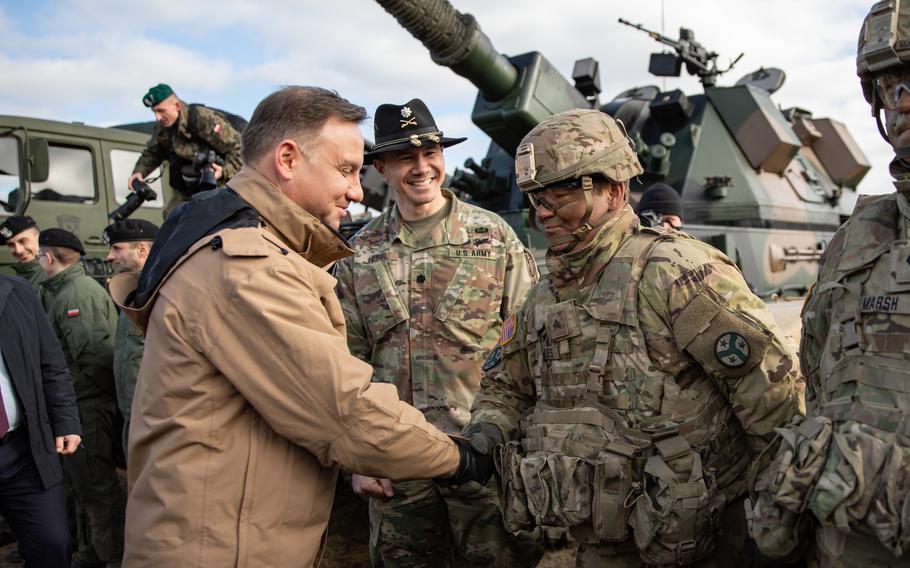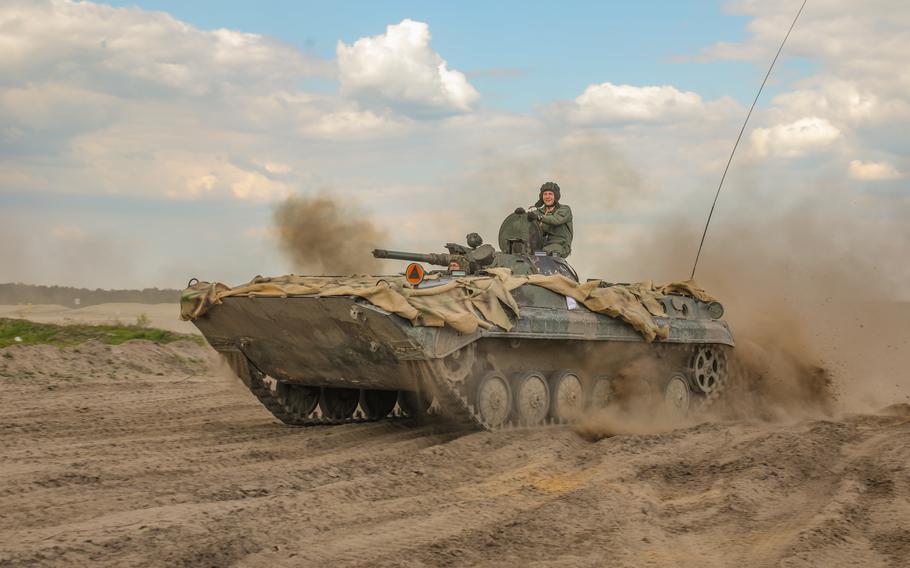
Polish President Andrzej Duda meets with U.S. soldiers during a visit to Bemowo Piskie Training Area, Poland, in 2019. Duda has emphasized his country's ties with the U.S. military, which has made Poland a center of gravity for operations along NATO’s eastern flank. (Sarah Kirby/U.S. Army)
A coalition on the cusp of winning Poland’s national elections is expected to maintain the country’s support for Ukraine while prioritizing close military ties with the U.S. and NATO, according to analysts.
The stakes were high for Ukraine in Sunday’s election in Poland, where officials say voters took to the polls in numbers surpassing the 63% turnout in 1989 that ended communism in the country.
If Ipsos exit polling holds, three opposition parties appear to have enough votes to oust the conservative Law and Justice party, which has been in power since 2015.
While Law and Justice has been a strong backer of Ukraine, a dispute with Kyiv over grain exports has strained relations and prompted calls from within the party to scale back its support for the country.
One election scenario had the Law and Justice party forming a government with Confederation, a grab bag of right-wing and far-right parties whose common issue was ending Polish support for Ukraine.
But on Sunday, former Prime Minister Donald Tusk’s Civic Coalition along with two other opposition parties appeared to have secured enough votes to form a coalition that wants to hold the line when it comes to backing Ukraine. Exit polling has the opposition controlling 248 seats in the 460-seat lower house of parliament.
“The opposition broadly supports the government’s support for Ukraine, and resistance to Russian aggression, plans to increase defense spending, and continue to rely on NATO and the United States for the defense of Poland,” the Washington, D.C.-based Atlantic Council think tank wrote in an analysis of party platform positions ahead of the election.

Polish soldiers maneuver a PT-91 tank during an exercise at Nowa Deba, Poland, May 13, 2023. A new government coalition in Poland would be expected to maintain the country’s support for Ukraine and its close ties with the U.S. and NATO. ( Theresa Gualdarama/U.S. Army)
In recent years, Law and Justice ramped up defense spending, with tens of billions of dollars invested in advanced American hardware like Abrams tanks, Patriot missiles and F-35 fighters. Party leaders indicated Monday before the final tally that they may continue to try t0 govern in a new coalition.
Polish President Andrzej Duda, a Law and Justice ally, must call the first session of the new parliament within 30 days of the election and designate a prime minister to form a government.
Should the ruling party unexpectedly prevail, “Warsaw will still perceive the United States as its sole security guarantor, and will maintain its practice of favoring American defense companies over European ones,” the German Marshall Fund of the United States said in a pre-election analysis of party positions.
Duda also has emphasized Poland’s ties with the U.S. military, which has made Poland a center of gravity for operations along NATO’s eastern flank. Along with expanded U.S. troop rotations in the country, the U.S. Army last year established its first permanent garrison in Poland, in the city of Poznan.
There are no indications that a new government coalition would change course on hosting U.S. forces in the country. Still, the U.S. weapons industry could be in for more competition.
A new Polish government will stress improving a damaged relationship with the European Union. The Law and Justice era featured numerous disputes between Brussels and Warsaw, especially over migration issues.
The German Marshall Fund said relations with the United States and NATO would remain strong, but when it comes to weapons purchases, the new coalition would “would seek to balance these (U.S. acquisitions) by closer cooperation with the European defense sector.”